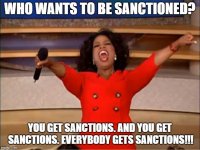Franklin Pierce
Well-Known Member
- Joined
- May 4, 2014
- Messages
- 25,128
- Likes
- 28,311
DUBAI (Reuters) - Iran’s currency plunged to another record low on Sunday, dropping past 100,000 rials to the U.S. dollar as Iranians brace for Aug. 7 when the United States is due to reimpose a first lot of sanctions on their economy.
In May the United States pulled out of a 2015 deal between world powers and Tehran under which international sanctions on Iran were lifted in return for curbs on its nuclear program.
Washington decided to reimpose sanctions on Iran upon its withdrawal, accusing it of posing a security threat, and has told countries they must halt all imports of Iranian oil from Nov. 4 or face U.S. financial measures.
On Sunday, the Iranian rial plunged to 111,500 against one U.S. dollar on the unofficial market, down from about 97,500 rials on Saturday, according to foreign exchange website Bonbast.com. Other websites said the dollar was exchanged between 108,500 and 116,000 rials.
Iran currency extends record fall as U.S. sanctions loom
In May the United States pulled out of a 2015 deal between world powers and Tehran under which international sanctions on Iran were lifted in return for curbs on its nuclear program.
Washington decided to reimpose sanctions on Iran upon its withdrawal, accusing it of posing a security threat, and has told countries they must halt all imports of Iranian oil from Nov. 4 or face U.S. financial measures.
On Sunday, the Iranian rial plunged to 111,500 against one U.S. dollar on the unofficial market, down from about 97,500 rials on Saturday, according to foreign exchange website Bonbast.com. Other websites said the dollar was exchanged between 108,500 and 116,000 rials.
Iran currency extends record fall as U.S. sanctions loom






